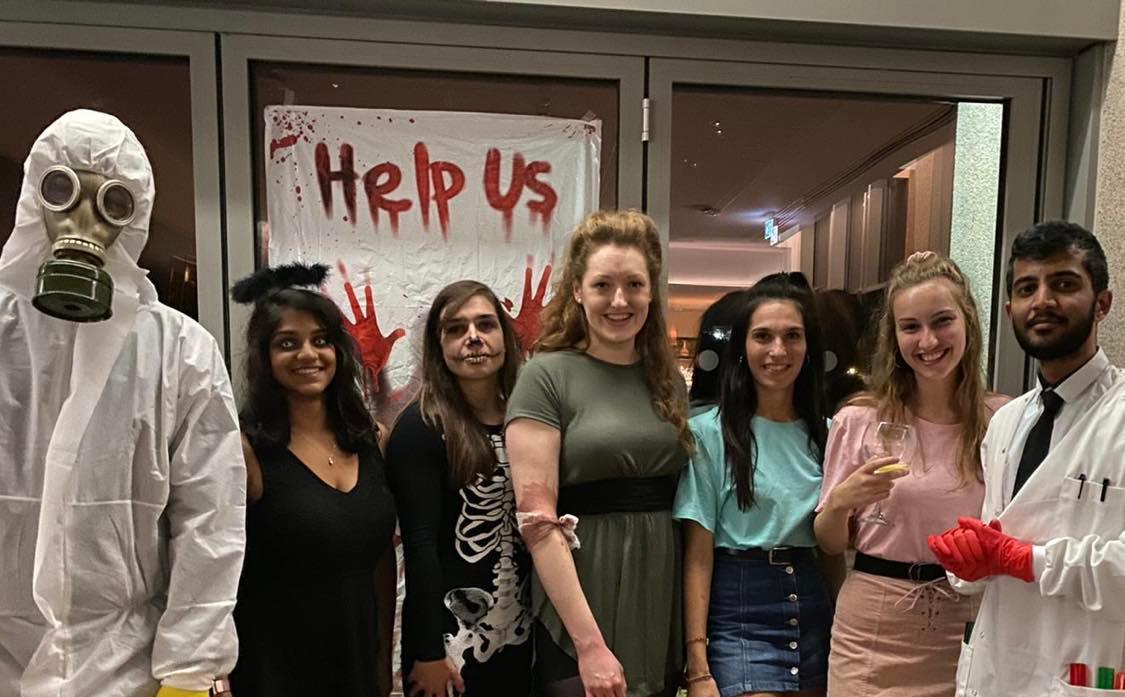
Top tips for new PhD students

My name is Laura, and I’m just entering the final year of my PhD. I started my PhD in Simon Cook’s lab in the Signalling programme, working with a biotech company called PhoreMost. We’re trying to identify novel regulators of KRAS, a protein mutated in up to 25% of all human cancers. This is a really exciting project and I feel like I’ve been very lucky with my PhD, but of course there have been some ups and downs along the way, which have taught me a lot! These are a few tips I would give to new PhD students, based on my experience so far.
Make the most of the student environment
I started at the Institute at the same time as my friend Beth. We studied together for our undergrad degrees in Birmingham, and moved to Cambridge together after graduation. This was great for me as I had a familiar face to look out for, which helped settle my nerves about starting somewhere new and not knowing anyone. But I didn’t need to worry! Aside from the people in my lab being so friendly and welcoming, the Institute has a great student community. The Graduate committee organises events for the students, from coffee mornings to parties at the Babraham bar and trips into Cambridge. I would definitely recommend attending these when possible – they allow you to socialise outside the lab and are always great fun!
As well as organised events, there is always someone around to go for lunch or grab a coffee with. It’s really important to take a break when you need it and talk to other people. This will quickly make you realise that the things you’re stressing about in the lab aren’t as bad as you think! And while it’s good to share any challenges you have with friends, it’s also important not to compare your progress with others. Some people are lucky and their projects take off from the very beginning, while others take a lot longer. That’s the nature of science! Whatever situation you’re in is okay – and you’ll get there in the end.
Change is not a bad thing
Some of the main challenges people in my year faced were the changes that occurred due to COVID. Not only did the labs close for a couple of months, but after returning to the lab there were many restrictions in place, designed to keep everyone safe. It could be difficult to get hands-on training in new techniques, often leading people to re-design experiments and get creative with their ideas. This was actually great for many people, and allowed them to explore areas of science they may not have otherwise thought about. I had planned to go to PhoreMost at the beginning of my PhD and do a three-month placement there, with this work then being the basis for the rest of my project. As I was unable to complete my placement at the time, my project had to be changed. This initially made me nervous, as I had only just started my PhD and already things weren’t going to plan! But as soon as I had a conversation with my supervisors, both at the Institute and at PhoreMost, I realised I wasn’t going to have to figure things out alone, and we quickly came up with a new plan for my PhD.
Whilst none of these COVID-related problems are likely to affect new students, your project will still probably change along the way – and this isn’t a bad thing. Science is unpredictable, and it is unlikely that the plans you make in your first few weeks as a PhD student will be the same 3-4 years later. The whole point of the research we are doing is that it is novel and hasn’t been studied before – so it’s okay if hypotheses don’t work out and you have to adapt your project as you go. I ended up with a project that I love, and am grateful for the changes that were made!
Location, location, location
One of the great things about the Babraham Research Campus is the opportunity for collaboration with the many exciting biotech companies that share this site. My project is partnered with PhoreMost, a company that used to be based on site but recently moved to Sawston. Earlier this year I was able to complete my placement there, after a delay due to COVID. As my whole PhD is in collaboration with PhoreMost, I’ve kept in touch with them since I started, having monthly meetings with my supervisor and various people at the company. Despite this, the first day of my placement was the first time I’d actually set foot in their labs, so it was still a big change! During my three months there I learnt a lot about working in industry and the drug discovery process, as well as developing my skill set in a whole new range of techniques and equipment. The best way to learn about the companies on site is at the Campus coffee mornings, where you can chat to representatives about their work.
As well as making the most of the people and facilities based at the Institute, also make the most of the amazing grounds! Babraham is a beautiful place to work, so find the time to go for walks, sit in the walled garden, visit the orchard, and enjoy the campus parties and barbecues that take place in summer!
People are here to help you
Something many people struggle with at the beginning of their PhD is asking for help. Just remember – no-one is expecting you to be an expert! Everyone in your lab was in the same situation as you at one point and needed some extra help and guidance at the beginning, so don’t hesitate to ask questions and double check things if you need to.
During your PhD there will be many opportunities to present your work to others, from informal lab meetings to institute-wide seminars and even large conferences. These are always nerve-racking, but one thing I’ve learned is that all of these are for your benefit. The only way to get new ideas and suggestions for your project is to share your research with others. Every time I’ve presented I’ve been given ideas for new experiments to try and directions I could take my project in, that I may not have otherwise thought about. Also, every time you present gets easier and easier and your confidence will build, so make the most of the opportunities you’re given!
Look after yourself!
The most important piece of advice of all… look after yourself! Although its sometimes easier said than done, try to get the right work-life balance that works for you, and means you can get the best out of yourself at work while still finding the time to relax and do the things that make you happy. For me, this is cooking, reading, watching terrible horror films on Netflix and taking my inflatable kayak on the River Cam.
Good luck and enjoy your PhD!
